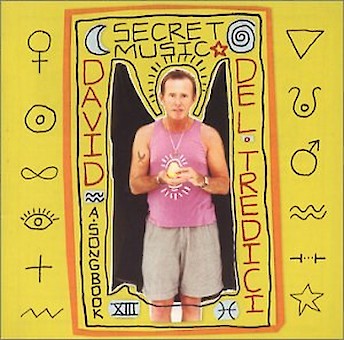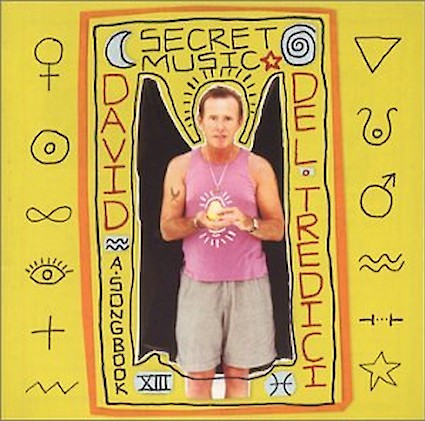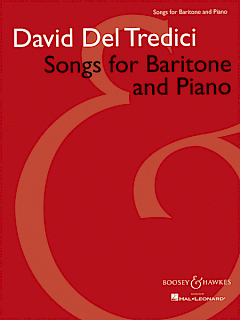"Quietness" is a tiny Rumi poem, exhorting the reader to follow a meditative path through surrender to ecstacy. Each line, Haiku- like, reveals an insight. Some are paradoxical, others profound.
Michael Klein's "Drinking Song" is a pisser. In my obstreperous setting the piano is the drunk — rough, relentless, seductive, "dangerous." Never sure of his safety or whether he's "riding" a "dolphin" or a "shark," the poet (like the singer) hangs on for dear life—that is, till the last line.
"Matthew Shepard" by Jaime Manrique touched me. The brutal homophobic death of this innocent resonated with my own loss through AIDS of a young lover, Paul. To surround with music that moment when the soul leaves the body, that transformation of pain into bliss, was my inspiration and challenge.
The Marathon will remain in my memory particularly for some recent songs by David Del Tredici. Sung by the baritone Richard Lalli with the composer as the excellent accompanist, they were so over the top in Romantic expression as to be far out, indeed....
"These songs-often quirky, sometimes poignant, and unfailingly inventive, sound as if they were written at white-hot speed, and produce a blending of text and sound that is so complete as to leave the listener unable to detect the exact point where word becomes music, and music becomes word. They have Schubertian economy of means and directness. The precisely right musical gesture at the precisely right time. The dimensions and parameters of art song tolerate nothing less.
"Miz Inez Sez, composed between 1996 and 1998, uses texts by Colette Inez, who is, by her own admission, a "collapsed Catholic," a state that makes her and Del Tredici kindred spirits. In this all too brief five-song cycle, all stops are pulled. Manic humor and flamboyantly over-the-top (and repressively allusive) gestures are tempered with an underlying humanism that makes this most entertaining music far from mere entertainment. Soprano Hila Plitmann deserves extra battle pay. She negotiates her often torturously high-lying passages with commendable ease, and projects the subtexts of the poems masterfully. Del Tredici shows himself to be a fine pianist."
The Three Baritone Songs (composed in 1999) are culled from a larger cycle titled Inspirational Song. The text of "Quietness" was written by the ancient Sufi mystic Rumi, who, in the words of Del Tredici, "exhorts the listener to follow a medidative path through surrender to ecstasy." The remaining two songs set texts by Michael Klein and Jaime Manrique. The first of them describes various states of drunkenness, and ultimately, the hang-on-for-dear-life aspect of the disease. the final song, "Matthew Shepard," presents a metaphorical allusion to an AIDS-claimed lover of Del Tredici through the story of the young murdered Shepard. In it Del Tredici struggles with a moment that has largely escaped novelists from time immemorial, how to realize the moment when life becomes death. He does it as best can be expected.
His invocation, at its halfway point, to hymnody helps matters a bit, but also shows how our established and firmly entrenched religious communities stoked the fires that led to his murder. Baritone Chris Pedro Trakas acquits himself admirably in these performances.
"The collection of songs by David Del Tredici started the passionately hypnotic 'In the Temple," and the powerfully tragic "Matthew Shepard." Baritone Timothy Hill sang both with clarity and conviction. Later, Michael Polscer offered "Children," and the unexpectedly jazzy 'A Good Cry." David Del Tredici played his signature virtuosic piano parts expertly. Indeed, it is not enough to call these accompaniments, but rather "cocompaniments," for they rival the beauty of the vocal lines and could almost stand on their own as solo piano works. Amy Synatzske rounded out the Del Tredici songs nicely, ending with the concluding aria from Final Alice. In fact, all of the composer's songs are aria-like in nature, as they seem to occupy a plane somewhat above mere song. There is something operatic about them; one even hears an implied orchestration in the piano parts. Is it that the music is so well-crafted as to conjure up an array of timbres and colors? Or is it that Del Tredici knows his own instrument so well that he can push the limits of the piano, making it do more than we expect it to? I suspect it is a combination of both."
Audio (1)
Recordings (1)


Secret Music, A Songbook
2001, CRI/New World Records (CD 878)Works
Performers
- Hila Plitmann, Soprano
- Chris Pedro Trakas, Baritone
- John Kelly, Vocalist
- David Del Tredici, Piano
